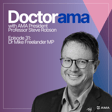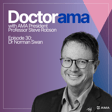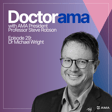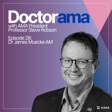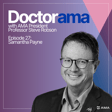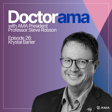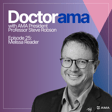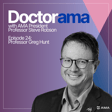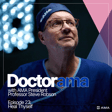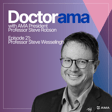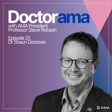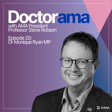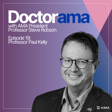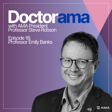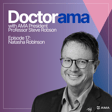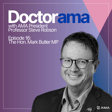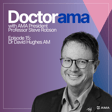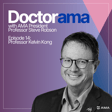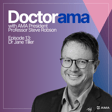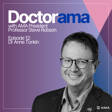Become a Creator today!Start creating today - Share your story with the world!
Start for free
00:00:00
00:00:01

Episode 3 - Sophie Scott
In episode 3 of Doctorama AMA President Professor Steve Robson chats with Sophie Scott OAM.
Recommended
Transcript
Introducing Sophie Scott
00:00:00
Speaker
My guest today is one of Australia's most influential health broadcasters. She's an author and an award-winning journalist, but recently she found herself suffering from a condition that will be very familiar to many of our listeners. But rather than just accept it, she made a decision to tackle the condition head on. We're about to find out just where that decision is later, today on Dr. Rama.
00:00:28
Speaker
You're listening to Dr Rama with Steve Robson, bringing you the best of health, medicine and people. So my guest today is Sophie Scott, who many of you will know from her many years as a health journalist for the ABC. Welcome to Dr Rama, Sophie. Thank you, Steve. Now, a few years ago, you asked me the worst question I've ever faced from a journalist. So it's my chance to get even with you today. So watch out.
00:00:56
Speaker
I'm not used to this role, so I'm getting used to it, but I still prefer to ask the questions, I must say. Well, look, there'll be plenty of chance for you to talk with us today. Sophie, what got you into journalism in the first place? So, Steve, when I was younger, the two professions that I was really interested in was either journalism or psychology.
00:01:18
Speaker
What I've realized over the years is there's actually quite a lot of crossover between the two. You need to be a good communicator, you need to have empathy, a good listener, be able to walk in someone else's shoes and understand them. But I think what really drew me to journalism was the creativity involved with
00:01:39
Speaker
understanding someone's story and being able to share that with a broader audience. I think when we understand someone else's story, we realize how similar we are with people than we might think. And so I was always sort of fascinated with other people's stories and being able to share them with a broader audience. So that's why journalism was such a great profession for me because I met, you get to meet amazing people like you and other fantastic doctors and healthcare professionals. And really you get to meet
00:02:09
Speaker
the pinnacle of their careers, people who are the best in the business of whatever they do. And as well as that, some amazing patients who I was able to walk alongside with and give them a voice that they wouldn't have otherwise had. So for me, that was extremely rewarding. Look, you've covered many, many stories over the years of all sorts, but there must have been one or two real standouts for you. Is there any really was an absolute standout for you?
00:02:37
Speaker
Look, I'll pick out three quick examples.
Sophie Scott's Major Stories
00:02:41
Speaker
The first example would be a series of investigations that we did about medical devices. And the patient that comes to mind with that story was a woman called Carol, who had actually developed a type of cancer from having breast implants. And I actually was with her and we filmed together when she was going to find out whether her cancer had returned. So it was a very emotional moment for both of us.
00:03:05
Speaker
And thankfully, the cancer hadn't come back, so it was a good outcome. The second story, and probably one of the most significant, was a young family that I interviewed, a husband and wife, Rachel and Johnny, who had lost their daughter, Mackenzie, to a condition called spinal muscular atrophy. And I sat with them, and we sat in Mackenzie's empty bedroom, and they told me about what they'd been through, only just
00:03:33
Speaker
weeks and months after it happened. And they were campaigning to have significant changes to genetic screening in Australia. And those changes have now happened, which was very rewarding to be part of that process. And then the third quick example would be a more uplifting, a really uplifting story of a patient called Andrea, who I met a mum with a couple of daughters who had multiple sclerosis.
00:03:59
Speaker
and was very unwell. But she was lucky enough to get into a clinical trial that was run at St. Vincent's in Sydney. And she was able to have a stem cell transplant, which really changed her outlook and really revolutionized how she was feeling and gave her health back. And so to see that fantastic outcome was very rewarding as well.
00:04:22
Speaker
And so yeah, I did so many stories, Steve, but they're ones that stay with me as well as any children that I interviewed as well. I think though, having four sons, myself, anytime I interviewed kids, it always really stuck with me.
00:04:35
Speaker
Sophie, like you, I had the pleasure of meeting Rachel and Johnny, and I was incredibly impressed by their advocacy and what they achieved. If I'd lost a child, I would have been crushed, and I'm sure it affected them profoundly, but they turned that into something really spectacular, and I agree with you. I think they were just a wonderful couple. They really were, and it was only, I think,
00:05:01
Speaker
less than three months after Mackenzie died that we sat down to do the interview. So it was really pretty astounding that they had such internal resilience and fortitude to be able to do that. But they wanted to make a difference, Steve. And they could see that there was a chance that they could turn such a tragedy into something to ensure that other parents wouldn't go through what they went through. And thanks to politicians listening and the media taking notice like we did,
00:05:31
Speaker
Then we did see action and so over a relatively short space of time, there were some major changes to genetic screening and it was only through the power of Rachel and Johnny telling Mackenzie's story that that happened. So that also really reinforces to me just the power of being able to tell someone's story or effect change.
00:05:54
Speaker
Yeah, look, I agree with you, Sophie. Now, you struck me as being at the absolute zenith of your powers.
Struggle with Clinical Burnout
00:06:03
Speaker
It was rare, a week to go by without seeing you presenting some really important story, whether it was on the news or from our radios. But I understand that a couple of years ago, something happened to you that really changed the direction of your life. Did you want to talk us through a bit?
00:06:22
Speaker
Yeah, I'm happy to share that. So what happened, it was actually before the pandemic that I really went through quite a serious episode of burnout, of clinical burnout. And I hadn't really heard that term before. And it was only when I was speaking to Professor Gordon Parker, who was writing a book on burnout, when he went through all the symptoms, the physical and emotional exhaustion, the feeling disillusioned.
00:06:46
Speaker
feeling like you're not making a difference, the cognitive difficulties that people with burnout have, as well as the physical symptoms that come with it, the effect on your autonomic nervous system, I basically ticked every single box. And it was only when I realized what it was that I could find a pathway out of it. And so the first thing was recognizing that I was really suffering from quite serious burnout.
00:07:10
Speaker
And the big wake-up call for me was the impact it was having on my autonomic nervous system. So I developed really serious dizziness. And anytime I stood up, the first time it happened, I was actually at a black tie dinner to honor some health care workers. And I stood up at the podium in my high heels and sparkly dress. And all of a sudden, these waves of dizziness just hit me out of nowhere. I had no idea what was going on. But it was these physical symptoms that really
00:07:40
Speaker
made me realize that something was going on with me that I couldn't continue to keep going the way I was. And I realized that I couldn't really just, you know, you can't think your way out of burnout as much as you might like to. I really had to focus on, you know, ask myself some hard questions about what I was doing and putting some good boundaries in place, you know, seeking support through my work, but then also thinking about, you know, why had I,
00:08:07
Speaker
attached to sort of being super busy and super productive to feelings of self-worth, which is something we often do, though that sense of perfectionism and noise having to be working. And what I had to do was really just rebuild my health through, I mean, in some ways, Steve, I was lucky because I knew that the practices that were gonna make a difference. I knew from my research and my books that I'd written about, I knew the impact of meditation on your nervous system. I knew the impact of exercise and of connection
00:08:36
Speaker
I just had to make a commitment to put those practices in place and really carve out time for myself instead of just constantly being working all the time.
Preventing Burnout
00:08:46
Speaker
And once I did that and really I was able to gradually build my health back up to the point that I was able to stay at work and stay at a job that I really enjoyed and covered a pandemic, which really made things go out of control in terms of the workload, but I was able to do all that
00:09:05
Speaker
you know, while recovering from burnout because I'd put those practices and those protective mechanisms in place. And one thing I've learned since because now I'm really, you know, I talk a lot about burnout now with, with teams and with companies and at workplaces is having an identity outside your work is a very important protective factor against burnout. So if you, if you totally see yourself as whatever your job title is, that's a real red flag.
00:09:32
Speaker
because you're so tied up in what you do with your work that you probably find it hard to switch off on weekends. You probably find it hard to say no. And so I think that's something now that I say to people, prioritizing things that you enjoy doing outside your work where people don't know you as a surgeon or they don't know you as a GP or they don't know you as a health reporter. They just know you as a person. And that's one of a number of protective factors that people can put into place.
00:10:00
Speaker
take themselves against burnout. So this obviously had a big impact on you. Did your family notice that you were having problems like this or were they a bit oblivious to what was happening? I think they were a bit oblivious. I mean, I've always worked full time. My husband and I, we've got four sons. So we had a busy household and lots of people coming and going. And I think
00:10:26
Speaker
My kids were always used to me doing lots of work and being really busy. And I think when you've got kids as well, you tend to sort of put on a brave face and you don't want to worry them if you're not feeling 100%.
00:10:38
Speaker
From their point of view, I think they wouldn't have really known anything was different. It was really more when I started having these physical symptoms that I just couldn't ignore. I know the body sometimes tells us, even when we don't want to listen, the body sometimes tells you what you need to hear.
00:10:57
Speaker
And so for me, it was a matter of just thinking, sort of stepping back a little bit, thinking about what I really valued. You know, I was, I really enjoyed my job and I think it's an important point that sometimes people think you can only get burnt out if you've got a crappy job or a crappy boss, but you can actually become burnt out even in a really fulfilling job. And we know Steve, for example, that the rates of burnout in healthcare professionals is higher than normal. We know the rates of burnout in women is really high.
00:11:26
Speaker
and people with caring responsibilities. And the research shows that more than 50% of people in workplaces are reporting signs of burnout. So it really is a very important issue for people to be thinking about and ideally not wait until they get to where I was when you start feeling really crappy and identifying the signs much earlier and doing something about it.
00:11:48
Speaker
Well, I really take my hat off to you recognizing it and taking action. But you did more than take action. You've become a real advocate for dealing with burnout. And as you told me before, you've actually been working with various people. What have you learned since then in working with other people and talking to them about burnout? Any lessons that have really come to the fore for you? Yes. So now I do, I go into workplaces, I talk to teams about
00:12:14
Speaker
about dealing with burnout. One thing that's very common that a lot of people talk to me about is often I talk to managers and executives and they're feeling okay, but it's their teams that are burnt out and how do they navigate that? So that's something that I've been doing a lot of work in that sphere as well. And so I talked to them about things like they need to make their health a priority. They need to lead by example so that they're setting good boundaries over their time.
00:12:43
Speaker
they need to show because leaders often underestimate the impact they have on other people. They underestimate the impact that they have on their staff, their team members. So if they're sending emails from six in the morning till midnight, that's saying to your staff, I expect you to be reading emails at this time of day. And so that's something that I think a lot of leaders can take on board to think about how are they modeling, what behaviors are they modeling that the team might be taking on.
00:13:13
Speaker
And then also advocate for your team. If you're a manager and you can see that the team is really burnt out, then advocate for them to think about, you know, how can we get more resources? Can we get more support? And also for people, you know, if you're a manager and your team's feeling overwhelmed and burnt out, to be a source of optimism and a source of strength for your team members and to be thinking about cultivating that sense of community within them, within that team, and to celebrate the wins that they do have
00:13:44
Speaker
instead of focusing on the things that might not be going well because we are very much driven by what we focus on is often what we get. So if you're focusing on the things that aren't going well and what's not working, that's what you're going to tend to get from people. Whereas if you focus on even the small wins that people have, you're going to get more of that. And so often just that reframing can be really
00:14:06
Speaker
important for people to understand. Yeah, I think they're really good points. Now, you've really had a bit of a, you've really branched out. It struck me that you had an incredibly busy job as it was, as the health, the main face of health on the ABC. But you branched out further. Do you want me to tell, do you want to tell us a little bit more about where you're at at the moment, what's happening in your life?
Focusing on Mental Health
00:14:29
Speaker
So since I've left the ABC, I've really become much more involved with
00:14:35
Speaker
speaking to people, going into workplaces and talking to teams about things like preventing burnout, about managing your mindset and mental health, and about looking at the science. I guess the difference, Steve, with what I do is that I really look at everything from a very evidence-based point of view. And I show all the science because for me, that's a big motivator to say, look, there's good science to back this up. This is why it's going to make a difference, whether it's just building in some
00:15:02
Speaker
regular exercise, the power of connection and how that's so important for how you feel. Also, the other thing that I talk to different teams and groups about is that often we're looking for some radical overhaul of our life to feel better, but it's often these very small changes that actually can make a massive difference.
00:15:22
Speaker
Thinking about what small changes you can make that you can stick with. I think of it a bit like a ship. If you imagine a ship setting course, if the ship just changed direction 1% per day, it would end up in a very different destination. It's the same with your own health and wellbeing. Those small changes that you can just embed in your life and make it just a matter of habit.
00:15:45
Speaker
can actually transform how you feel. You don't need to have a radical transformation. It's about small changes, but being consistent. And again, that's what all the research shows works for long-term behavior change. So I think our listeners could go to your website at sophiescott.com.au. Is that right? Yeah, I would love people to have a look on the website. I've got a newsletter that I send out fairly regularly with lots of free resources about mental health and the latest studies that are coming out.
00:16:13
Speaker
There's lots of great information there about preventing burnout, about managing your mindset. And yeah, I'm just glad that I can use the skills that I had at ABC. I can now use those to help people in a different way. That's what my goal is at the moment.
00:16:30
Speaker
Yeah, I think it's fantastic. Now look, it's been absolutely fantastic chatting to you this afternoon. Now at the start I said you'd ask me the worst question I ever got from a journalist and I'm going to tell everybody what that was right now. I was mic'd up in front of a camera and you said to me, when are you going to take some responsibility for all the misery you've caused?
00:16:52
Speaker
Now, I want you to know, Sophie, everything is forgiven. I've enjoyed speaking to you so much today. I think it's wonderful. I think the work you're doing is fantastic. I'd like to thank you for taking the time to speak to me today, and I hope we get a chance to speak again before too much longer.
00:17:09
Speaker
Thank you, Steve. I'm sorry it was a hard question, but I think that's one of the things about being an investigative journalist in particular. You have to be not shy away from asking the hard questions, and you took it very well. And I'm glad we're friends now. It's lovely talking to you. Everybody, we've been talking with Sophie Scott this afternoon. You can go to a website at sophiescott.com.au. And that's it for Dr. Raman.
00:17:44
Speaker
You've been listening to Dr Rama, a podcast produced on Ngunnawal country by the Australian Medical Association. All rights reserved.
